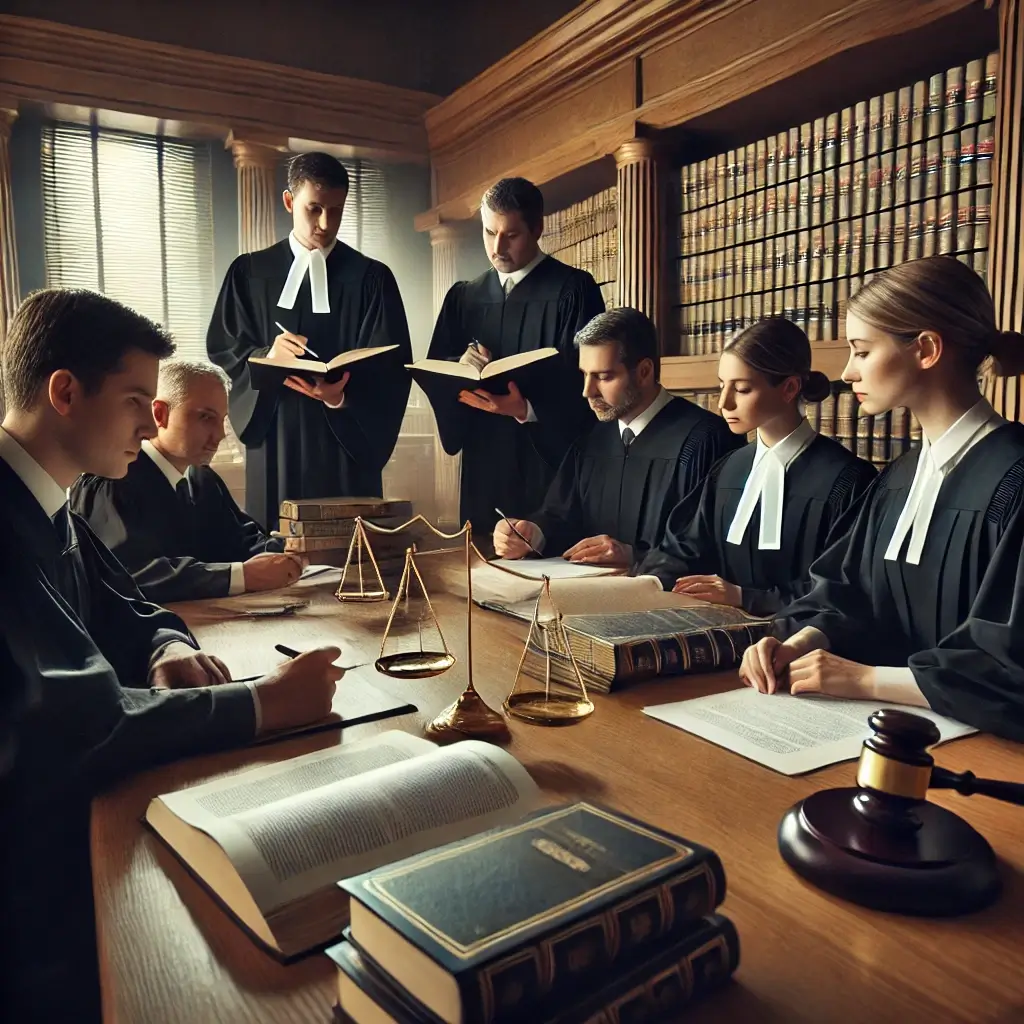Imagine you've just lost a case in court—maybe something important, like a fight over custody of the children, or something mundane, like a parking ticket that got totally out of proportion. You're angry, so you appeal in the hope some higher court will turn the tables. But then what? What are appellate judges looking for when they review a case? It's not something most people think about until they're stuck in the court thicket, hoping to have some idea of how to flip the case. The appellate judges aren't necessarily repeating what the trial did—their job is specific, and understanding what they focus on may be the determining factor between win or loss on your appeal. So, let's break it down—what do appellate judges look for when they review a case, and why should you care?
The law system's got depth, like a cake you wouldn't wish to eat. Trial courts are where the drama occurs—witnesses, proof, arguments. Appellate courts preside over it all, checking to see if the trial went off track. When you appeal, you're asking these judges to take another look—not to redo it all over again, but to find errors that matter. What do appellate judges look for when they review a case? It's not tears and new stories; it's rules, fairness, and cold hard law. We're going to do it step by step, and keep it real—what are appellate judges searching for when they review a case, and how do they make the determination on whether you receive a do-over?
What Appellate Judges Look for When They Review a Case: The Basics
Let's start at the beginning—what are appellate judges looking for when they review a case at its essence? They're not there to relive the trial, call witnesses, or sort out who's deceiving whom. They're there to review twice the amount of work done by the trial court. Did the judge below play fair? Was the process level? That's the foundation. What are appellate judges looking for when they review a case? They dive into the record—the pile of documents, transcripts, and trial decisions—to see if it all adds up.
Think of them quality control, not the head chef. They don't cook the meal; they just make sure it wasn't poisoned. What do appellate judges look for when they review a case? They're going back and following up on errors—giant errors, like when the trial judge introduced questionable evidence, or little ones that may have thrown it off. It's less a question of "who's right" and more one of "was it done properly." That’s the basis upon which to find out what they’re doing—what do appellate judges look for when they review a case to keep the system honest?
What Appellate Judges Search for When They Consider a Case: Mistakes of Law
So, what's the beef? What are appellate judges looking for when they examine a case in the context of blunders? Legal blunders are the headliner. Maybe the trial judge botched a law—like pronouncing a contract's good when it's legally dead on arrival—or used the wrong playbook altogether. What are appellate judges looking for when they examine a case here? They're looking to determine whether the law got twisted or dodged.
Think about a battle over a speeding ticket—so the radar on the cop was broken, but the judge shrugged and admitted it anyway. That's a legal error; rules of evidence were ignored. What would appellate judges be searching for when they hear a case like that? They'd zero in on whether busted radar should have been excluded or not. If the law says bad equipment doesn't fly, they could throw out the conviction or send it back. It is a question of the law staying in the forefront, not hunches or shortcuts. What do appellate judges look for when they review a case to ensure legal accuracy?
What Appellate Judges Look for When They Review a Case: Procedure Problems
It's not the law itself, what are appellate judges looking at when they're looking at a case about how the trial played out? Procedure's a tremendous component. Did the trial play by the book? Were your rights run over? What are appellate judges looking at when they're looking at a case here? They're looking at things like whether you had a fair shot to have your say or whether the jury was improperly instructed.
Imagine the jury being asked to render a decision based on trash—like your gaudy shirt instead of the facts. That's a technical error. What are appellate judges looking for when they're hearing a case in that chaos? They'd want to know, "Did those wacky instructions taint the verdict?" If the trial was chaotic—unfair or sloppy—they might call for a retrial. Fairness isn't a buzzword; it's the basis of their profession.
What Appellate Judges Hear When They Receive a Case: Questions of Evidence
Evidence is another doozy—what exactly are appellate judges looking for when they hear a case about what ended up in the courtroom? They are not there to receive new stories—you can't wander in with a new witness or a smoking gun on appeal. They only receive what's already in the record. Was it appropriate? Was it handled impartially? What are appellate judges looking for when they examine a case here? They're testing whether the trial judge let in junk—like rumor—or kept out material that ought to have been open season.
Picture this: a critical email in your favor was cut down because the judge did not connect with it, although it worked out. What is an appellate judge looking for when they're reviewing a case like that? They'd want to know, "Did that call tip the scale?" If so, they can step in and say, "Hold up." It's all about making the evidence game fair—no foul play allowed.
What Appellate Judges Look for When They Listen to a Case: The Standard of Review
That's where it becomes tricky—how strictly appellate judges reviewing a case look at it? It's referred to as the "standard of review," and it can be the difference. For errors in law, they start over—"de novo" review. What do appellate judges look for when reviewing a case under this? They're saying, "Was the law correctly applied?" They don't mess around; they recompute from scratch.
But for things like trust in a witness or trivial calls—like how long of a break—a break is—they're more lenient, invoking "abuse of discretion." What are appellate judges looking for when they're reviewing a case here? They're only looking to see if the trial judge lost their minds, not whether they would have decided differently. It’s a pat on the back for the lower court unless they completely lost the plot. Understanding this gives you an idea of how hard your appeal is going to be—what do appellate judges look for when they review a case to balance deference and scrutiny?
What Appellate Judges Look for When They Consider a Case: Precedents
Law's a history lesson—what do appellate judges look for when they consider a case with old rulings? Precedents are nuggets of gold. They read through past cases to see how similar things were handled. What do appellate judges look for when they consider a case here? They're reconciling your mess with what big courts—like the Supreme Court—have laid down before.
Suppose a previous case had stood, "No jail for first-time shoplifting," and yet you ended up in jail. What are appellate judges looking for when they're reviewing a case with precedents? They want to make sure your trial fits the mold—law's not meant to be unpredictable, like a wild card. If the previous decisions aren't uniform, they might get things back on track.
What Appellate Judges Look for When They Review a Case: Your Argument
Your appeal is not them playing detective—what are appellate judges searching for when they're reading a case based on your pitch? You've got to establish the problem. Your lawyer files a brief, detailing why the trial went off the rails. What are appellate judges searching for when they're reading a case here? They're reading your argument—did you highlight a genuine goof, or are you simply bitter you lost?
If you say, "The judge threw out my star witness," they'll razz you about it. But if it's "The jury didn't like me," they'll shake their heads. What do appellate judges look for when they review a case in your own words? They look for substantial reasons—something to bite down on, not grievances.
What Appellate Judges Look for When They Review a Case: Outcomes
What's the bottom�ng line? What do appellate judges look for when they consider a case to bring it to a close? They've got three plays—affirm (leave the decision alone), reverse (turn it around), or remand (send it on). What do appellate judges look for when they consider a case to select one of them? If the error was gigantic—like an incorrect law ruining the whole thing—they might reverse. If it's tiny, like a typographical error in the minutes, they might let it pass.
Say the trial judge botched a critical call, such as allowing a phony confession in—they could remand for a re-do. What are appellate judges searching for when they look at a case here? They're balancing whether the mistake really swung the game, rather than whether it irked you.
What Appellate Judges Look for When They Review a Case: Real-Life Examples
Let's be practical—what do appellate judges do when they decide a case on appeal? Use the divorce case—let's say the trial judge gave all of one spouse's stuff to the other because they misinterpreted property law. On appeal, the judges might say, "Whoa, that's not how it works," and fix it. Or use the criminal case—maybe a fellow got 20 years because the jury read a text that they shouldn't have. What are appellate judges looking for when they take a case like that under review? They'd see if that text contaminated the verdict.
Think of history—Brown v. Board of Education in 1954. Lower courts said that schools must be segregated; the Supreme Court disagreed, recognizing an error of law in "separate but equal." What are appellate judges looking for when they review a case in landmark moments? They're looking for flaws that have consequences beyond one person.
What Appellate Judges Look for When They Review a Case: The Process
How do they do that, anyway? What are appellate judges doing when they consider a case in the course of their everyday work? It starts with briefs—your brief and the other guy's, laying out the meat. Oral arguments—lawyers speaking before the judges, answering questions. What are appellate judges examining when considering a case here? They are comparing your story to the record and the law.
They get together close, confer and write an opinion—majority some times, divided some times. What are appellate judges examining when they review a case in this step? They're determining what went wrong and why it mattered, dissecting it simply so everyone can get it. What do appellate judges look for when they review a case to make their final call?
What Appellate Judges Look for When They Review a Case: Why It's Hard
Appeals aren't easy—what are appellate judges looking for when they receive an appeal of a case that makes it tough? They don't play around with facts that much—if the jury swore under oath you did it, that's usually that. They're stuck with the trial version unless it's bonkers. What are appellate judges looking for when they receive an appeal of a case here? They're asking, "Was the law used?" and not "What happened?" That’s why success is rare—only 10-15% of appeals overturn the script.
Wrapping It Up
So what are appellate judges searching for when they read a case? It's a hunt for errors—legal mistakes, procedure blunders, evidence errors—compared to the law, previous cases, and your argument. They're not reliving your fight; they're upholding the rules. What are appellate judges searching for when they read a case at the end? Rules and fairness, not a mulligan. Next time you’re staring down an appeal, this is your cheat sheet—they’re not superheroes; they’re just folks with a rulebook, making sure it’s followed.



